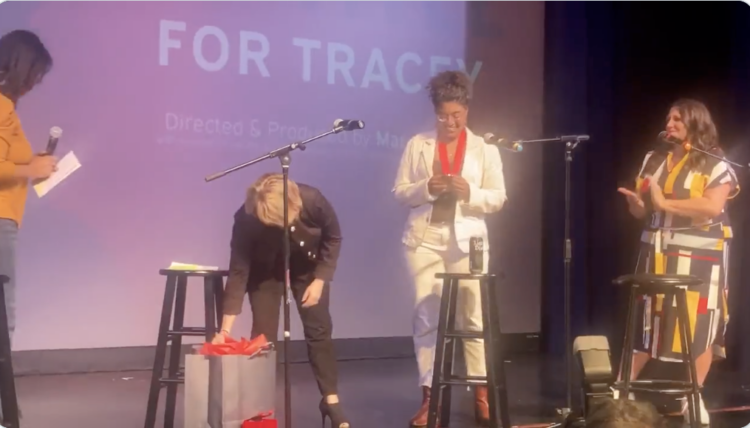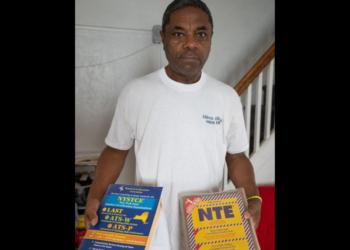Thirty-eight years ago, Tracey Meares was a senior at Springfield High School with the highest grade point average in her class. With her impressive achievement during the school year, Meares was prepared to become class valedictorian in 1984. However, a racist principal’s actions prevented the exceptional student from having the honor, prompting a local filmmaker to shed light on the incident with a documentary about systemic racism. The film No Title For Tracey premiered on April 16, and now she is being honored with the title.
Meares’ valedictorian title had resurfaced after a State Journal-Register article mentioned her keynote speech at the Martin Luther King Jr. Breakfast in Springfield in 2019, referring to her as “the 1984 Springfield High School valedictorian,” SJR reported.
Though her parents always knew she was the real valedictorian of their family, others found the information quite surprising.
“When I was talking to Allan Woodson (from Frontiers International, who invited Meares), he said, ‘I thought she was the valedictorian,'” recalled Carolyn Blackwell, Meares’ mother, with a laugh. “In our minds, she was the valedictorian.”
While Meares would have been the first Black woman to become valedictorian in Springfield High School history, she later became the top legal scholar at Yale College of Law. In addition, she is the first Black woman to hold a tenured professorship at the institution. Meares finally received recognition for her academic achievements nearly four decades later with a ceremony last weekend, per the Illinois Times.
Springfield School District 186 Superintendent Jennifer Gill presented Meares with the valedictorian medal and a certificate following the screening of the documentary. No Title For Tracey was viewed by 320 people who attended the Hoogland Center for the Arts event.
https://twitter.com/StevenSpearie/status/1515441290724450319
Gill, a freshman at SHS when Meares was a senior, decided to look through the school’s documents to verify her GPA ranking for the school year. After learning the surprising details, Gill shared them with Meares during the ceremony.
“My first reaction is that it’s incredibly gratifying, but it’s also a lot to process,” Meares said after the presentation. “There are a lot of different things that happened. It’s the metaphor of a dry sponge. When you pour a bunch of water on a dry sponge, it takes a while (to soak it up).
“It was overwhelming (to see this many people here). I had a lot of trepidation about coming back here and meeting my 17-year-old self and a lot of the emotions I have about this whole incident are emotions I had when I was 17,” she added.
Many of Meares’ supporters, including her parents, Robert and Carolyn Blackwell, believed systemic racism or institutional racism contributed to their daughter being stripped of the prestigious honor.
“In terms of getting the record straight,” Robert said, “and making people whole and helping the community understand what the right thing is or was, how do you make things right? What is justice in this situation? I think it’s an important gesture.
“It’s like reconciliation in some way,” he noted.
At the time, Meares was 17 and taking advanced and weighted classes in high school. Her father recalled a school secretary thoroughly calculating numbers and grades for class students. However, an assistant principal, who was white, was caught rifling through Meares’ files, and her counselor, Pauline Betts, was forced to put a lock on the cabinet to prevent others from tampering with the documents. Later on, she confirmed that Meares had the No.1 rank in her class.
“(The secretary’s) records indicated that given the requirements of the titles of valedictorian and student rank, Tracey had the highest rank in the school and had therefore earned the title of valedictorian,” Robert said.
Springfield High School initially had a valedictorian and a salutatorian to be selected before graduation. However, they opted for the title “top students” for Meares and Heather Russell, who was white. The high school didn’t resume its tradition of valedictorian and salutatorian until 1992.
“It was not an individual act,” Robert exclaimed. “That’s what makes it systemic.”
“Who would do that to a young person?” Carolyn asked. “Why would you do that? We didn’t dwell on it because at that time we were, like, let’s celebrate this girl. But who would do that to a young person and every person after that until 1991?”
Meares’ high school experience captured the attention of Maria Ansley, a photographer for the Southern Illinois University School of Medicine. She wanted to produce the documentary while shedding light on systemic racism in America. She started filming last fall with Meares at Springfield High School and asked her parents for permission as they provided her with photos and other important information that was used to create No Title For Tracey.
“The fact the story is being advanced by a young white woman,” Robert said, “says it all, that her sense of this being so incredulous, that this was happening in her city to someone who did not deserve this and the only reason that it happened that (Tracey was) Black.
The film garnered much praise and recognition from viewers as Meares unapologetically shared her truth with Ansley in the documentary.
When asked why she signed onto the project, Meares said she did it for her sister.
“I think she thinks that bringing this to light is going to matter for other people,” Meares said. “She’s not doing it for me, per se. That is sort of the point of racial justice, that when people engage in projects like this, they actually aren’t doing it for themselves.
“Will it be a benefit for the community? Sure, especially for the kids who go to school at SHS. So, I imagine it matters to some people to hear this story and to understand.”
Watch the trailer for No Title For Tracey below.









